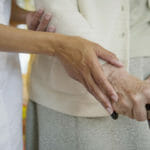

Caregivers are the undisputed heroes of the current coronavirus (COVID-19) crisis. From doctors, nurses and nursing assistants in skilled nursing facilities and hospitals, to in-home health providers and family caregivers, the world has seen the dedication and passion that caregivers possess for the health and well-being of seniors and vulnerable adults.
Even before COVID-19, the need for caregiving resources was significant. In fact, when you look at paid and unpaid caregivers, recent data shows there are 43.5 million unpaid family caregivers and 2.5 million paid caregivers in the United States. Those numbers are expected to increase as the last of Baby Boomers turn 65 and as the burgeoning Millennial population ages.
The ups and downs of caregiving
Providing care for an older adult with a chronic illness or a disabling condition can provide a sense of fulfillment, meaning and purpose. Unfortunately, along with fulfillment, research shows caregiving is also associated with elevated levels of depression and anxiety, higher use of psychoactive medications and compromised immune function. And over half (53%) of caregivers indicate that a decline in their health compromises their ability to provide care.
Now, with the COVID-19 pandemic, caregivers find themselves working beyond their limits to provide care and stay connected with patients and their loved ones in a time when traditional, face-to-face care is prohibited. Functioning in these conditions can cause caregivers to wonder:
- Am I keeping the elders I care for safe?
- Am I keeping myself safe?
- Am I keeping my own family safe?
Most people would agree that this is a defining moment in our lives and caregivers, in particular, are stepping up to serve humanity.
Caregiver, heal thyself
So, let’s talk about you. The COVID-19 crisis is taking an emotional toll on caregivers. You may feel this toll physically, feeling especially tired and heavy. You may feel this toll mentally, feeling fearful, irritable, guilty and conflicted. Know that you are not alone in these feelings and that this is perfectly natural.
As caregivers, we need to realize the importance of filling up our tank so we can continue to serve. If self-care is a foreign concept to you, start by asking yourself: What is my biggest struggle in caregiving during this crisis? What do I need most from family or friends or the patients I am helping to address this struggle right now (be as specific as possible)?
- Show compassion … to yourself. Apply the compassion you share with your residents to yourself. Practice words of encouragement like, “You’ve got this!” and “ My best is enough.”
- Limit media consumption. Be mindful of consuming too much COVID-19 media coverage. A little goes a long way, especially since much of the information is repeated and the incessant barrage can be stress-inducing.
- Prioritize sleep. To serve residents and their families, it is critical that you re-charge through rest. If you have difficulty falling asleep, try breathing deeply into your lower abdomen while mentally thinking of things you’re grateful for.
- Practice your top 3. Make a list of your top 3 self-care activities and practice one a day. This might include, time alone in your room, watching a TV show, taking a bath or long shower, spending time in prayer, calling a friend, or playing with a child or pet.
- Move your body each day. Go for a walk, if the weather allows. If not, moving about indoors and stretching for 10 minutes a day during break or before or after a shift, will significantly increase your ability to cope.
- Connect. Use phone and video calls to connect with your friends and family members. Talking with others who are in caregiving roles can generate ideas and provide a sense of support or community. Ensure that the patients you care for also have a simple, safe, and secure way to communicate with their loved ones.
- Follow the CDC guidelines. Carefully adhere to all safety procedures that have been issued. They are for everyone’s protection, and every person makes a difference in stopping the spread of this disease.
- Ask for help. If you feel overwhelmed or concerned that COVID-19 is affecting your ability to provide your normal, high-level of care for your patients, seek help from other family members, friends and community organizations.
Caregivers are truly unsung heroes. As frontline workers, you provide an invaluable service to the elders you care for, as well as to broader society. Just as we are instructed to do in airplane emergencies, put your own mask on first. This refers not only to your literal coronavirus mask, but also the metaphorical mask of self-care, self-forgiveness, recovery and rejuvenation.
Remember, there is no such thing as a perfect caregiver. Focus on this day and the small moments, tears, laughter, flare-ups, miscommunications and small kindnesses that accompany this important role you fill. Be gentle with your patients and yourself and know that asking for help can be the most meaningful and courageous step you ever make.
Kerry Burnight, Ph.D., is chief gerontologist for GrandPad. A former professor of geriatric medicine and gerontology at the University of California-Irvine, Kerry founded the nation’s first elder abuse forensic center, as well as the national nonprofit, Ageless Alliance: United Against Elder Abuse. She can be reached at [email protected].





